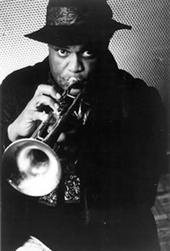This page created by: George Heid
One of the great jazz trumpeters of all time, Freddie Hubbard formed his sound out of the Clifford Brown/Lee Morgan tradition, and by the early '70s was immediately distinctive and the pacesetter in jazz. However, a string of blatantly commercial albums later in the decade damaged his reputation and, just when Hubbard, in the early '90s (with the deaths of Dizzy Gillespie and Miles Davis), seemed perfectly suited for the role of veteran master, his chops started causing him serious troubles.
Born and raised in Indianapolis, Hubbard played early on with Wes and Monk Montgomery. He moved to New York in 1958, roomed with Eric Dolphy (with whom he recorded in 1960) and was in the groups of Philly Joe Jones (1958-59), Sonny Rollins, Slide Hampton and J.J. Johnson before touring Europe with Quincy Jones (1960-61). He recorded with John Coltrane, participated in Ornette Coleman's Free Jazz (1960), was on Oliver Nelson's classic Blues and the Abstract Truth album (highlighted by "Stolen Moments") and started recording as a leader for Blue Note that same year. Hubbard gained fame playing with Art Blakey's Jazz Messengers (1961-64) next to Wayne Shorter and Curtis Fuller. He recorded Ascension with Coltrane (1965), Out to Lunch (1964) with Eric Dolphy and Maiden Voyage with Herbie Hancock and, after a period with Max Roach (1965-66), he led his own quintet which at the time usually featured altoist James Spaulding. A blazing trumpeter with a beautiful tone on flugelhorn, Hubbard fared well in freer settings but was always essentially a hard bop stylist.
